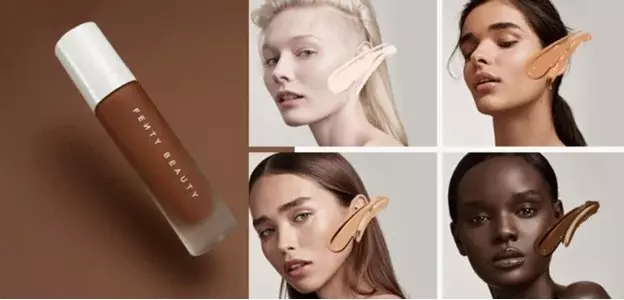
When we mention a term like inclusive or a word like diverse what is the first thing that pops up in your mind? Race, religion, gender? Maybe it is time that inclusivity becomes more than mere words, and becomes a value that brands understand and embrace. Maybe it is time that brands realized the importance of Inclusive Marketing, in order to speak directly to a wider variety of audience, and as a by-product also paving the way for a more inclusive world.
Let’s dig a little deeper into inclusive marketing and how a brand can use this strategy to bring change and explore an untapped market.

What is Inclusive marketing?
Inclusive marketing means a brand creating a marketing strategy plan which resonates with people who have been underrepresented or stereotypically portrayed. Be it racial and ethnic minorities, be it plus size models or be it LGBTQ individuals, inclusivity means to show the diversity of the real world by including people from all backgrounds.
For instance, a makeup brand which caters to young women, decides to create a post featuring a man using their product. Unexpected? Definitely, but inaccurate? Not necessarily. Such an approach reflects the positive attitude of the brand towards the different genders it serves, with a thoughtful and inclusive message for the society. This type of marketing helps in bringing positive social change and elevating diverse voices and role models. It even eliminates cultural bias.
In today’s world, it is very important for a marketer to relay the brand’s message in a way that it relates with everyone regardless of gender identity, age, race, ethnicity, religion, sexual orientation, etc. and elevate their stories.
Why inclusive marketing matters for a brand?
Customer is the king and ‘inclusive marketing’ matters, because they say it does.With time more and more brands have started catering to diverse consumers, which is why a consumer knows that they do not have to ‘accept’ being ignored by any brand they want to connect with.

According to a survey conducted by Adobe in the year 2019, 61% of their customers think diversity in advertising is important, as it has an impact on their likelihood to engage with a brand.
Moreover, as our societies have become more diverse, it’s important than ever that companies are thoughtful about the messages, images, voices, and values that represent their brands.
Increases brand’s reach
A brand can expand its reach in the market as inclusivity allows the company to find and connect with new customers. When a brand shows inclusivity and diversity in its marketing strategy, it creates a huge impact on how the potential customers see a company.
Inclusive marketing even helps the company to develop a closer and deeper relation with the existing customers in order to build brand loyalty.
Overall, this marketing technique will help your brand’s audience to grow.
Closer to the audience
Pop singer Rihanna’s beauty line Fenty Beauty is an epitome for how inclusivity in brand marketing can bring you closer to your audience. Her brand places “beauty for all” at the core of its marketing message and her focus on inclusivity is striking a chord with many people because it is authentic.

Her brand SAVAGE X FENTY featuring plus size models or gender-neutral products helped her get close to a wide range of consumers as they related to the marketing.
Boosts brand recognition
People respect a brand which offers inclusive marketing and genuinely shows what real people need. When a brand speaks the language of the consumers, they earn their trust.
A company which tries to avoid stereotypes and make more efforts to counter them, inspires people. Eventually it gets a brand more recognition in the market.
The smart thing to do right now is to incorporate inclusivity into the fabric of your brand.
How can your brand practice it?
Gather data and LISTEN TO IT!
The first thing on your list should be to throw every assumption you have made about your audience out of the door. You as a brand should dig deeper and research cultural intelligence to know your audience in a better way. The data analytics will allow you to clearly see the positive, negative or neutral responses to your advertising campaigns. Inclusive marketing does not mean just to gather data, it also means listening to it.
Once you study the data with an unbiased eye, you will be able to identify pitfalls in the marketing strategy plan which in turn helps you to create a relatable marketing campaign.
Reflect reality and tell universal stories
We see a mix of people when we go out in public. Just like the real world, a brand also needs to reflect real people in its marketing. People want to see themselves reflected in the media to feel inspired and heard. Use their real-life stories in your marketing image, video or more and infuse their language with yours.
After creating one, ask yourself if it elevates diverse voices. If it does, go ahead!
Show variety
Deloitte stated in one of its researches that ‘Millennials are the most diverse generation in history’. This means that marketers in the current scenario can no longer create the kind of narrowly-targeted campaigns that worked for them in the past. PEOPLE NEED VARIETY.
Potential customers are becoming increasingly aware of the social challenges that people of other sorts of backgrounds, philosophies, and ethnicities are facing. Hence, people not only want to see themselves but also a variety of groups.
So, think out of the box and create something which is welcoming, inclusive, and attractive at the same time.
It’s high time now! We are in the year 2021. Brands embracing diversity in their marketing should not be considered as a trend, it should be a norm.
Wish to know more about inclusive marketing from your brand’s perspective, reach out to us for a consultation. Drop us a line here.



